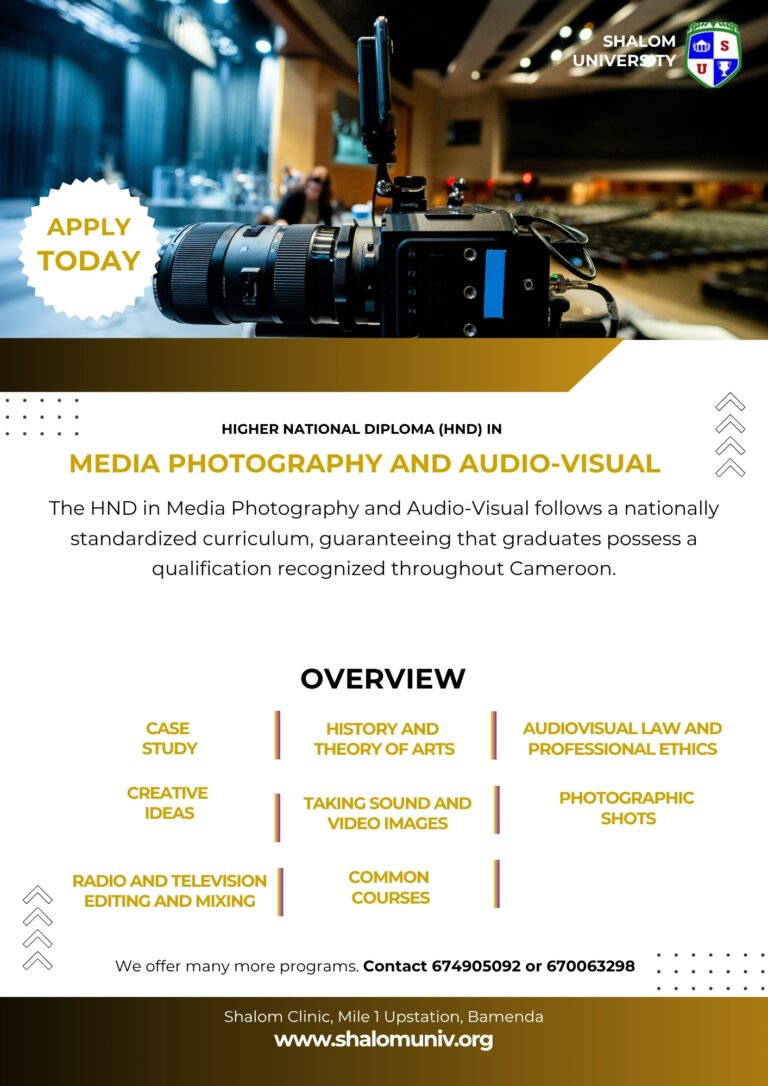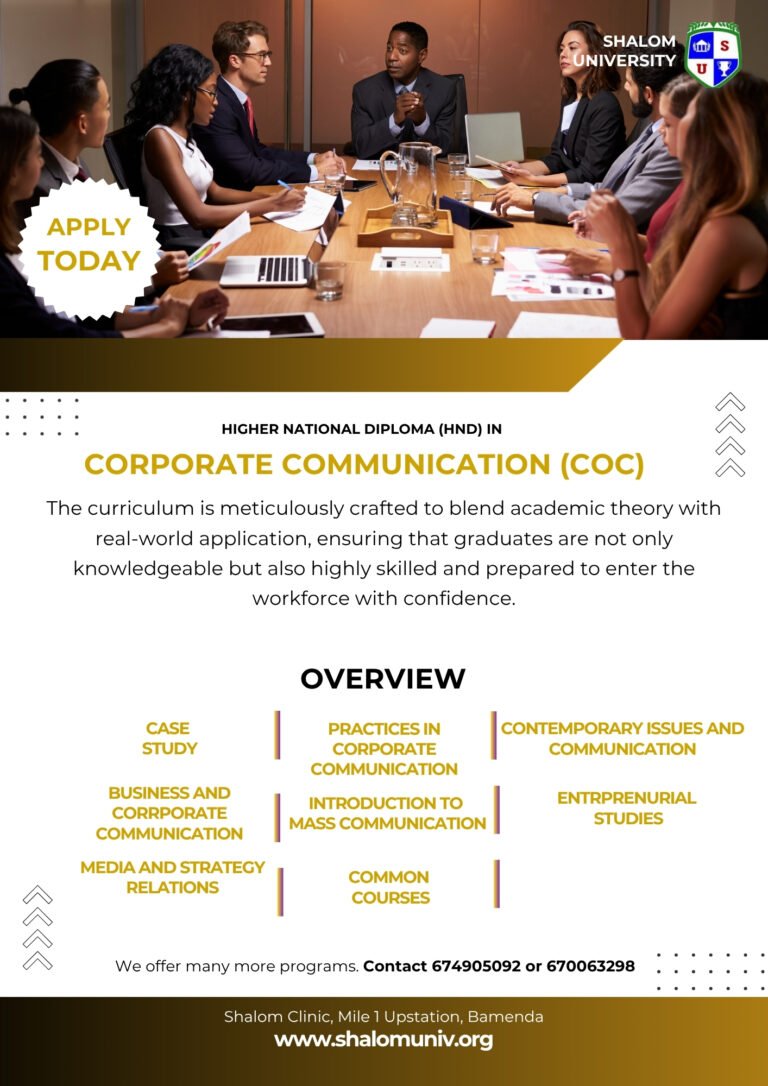In Cameroon, a vibrant and diverse nation with a complex media landscape, the role of a journalist is crucial for informing the public, holding power to account, and telling the stories that matter. From reporting on local community issues to covering national politics and international events, skilled and ethical journalists are essential for a healthy and functioning society. The HND in Journalism (JOU) at Shalom University in Bamenda is designed to train these professionals. This program provides aspiring journalists with the theoretical knowledge, practical skills, and ethical grounding needed to excel in Cameroon’s multifaceted media environment.
The curriculum at Shalom University is tailored to the Cameroonian context, blending foundational journalism principles with hands-on training in various media platforms, from print to broadcast and online. Graduates are prepared not only to gather and report news but also to manage media operations and understand the broader social implications of mass communication, ensuring they are well-equipped to contribute to the nation’s media industry.
The JOU Curriculum at Shalom University
The HND in Journalism program at Shalom University is structured around a set of core papers that provide a comprehensive and practical education in the field.
Paper: Case Study
The Case Study paper is a vital component that integrates all the theoretical knowledge and practical skills gained throughout the program. It challenges students to analyze complex journalistic scenarios, from ethical dilemmas in reporting to navigating legal restrictions on press freedom. This is particularly relevant for journalists in Cameroon, who must often operate within a dynamic political landscape and address sensitive topics.
The course trains students to:
- Analyze real-world journalistic challenges: Based on a given case, students evaluate the editorial decisions, ethical implications, or legal risks involved in reporting on a specific event in Cameroon.
- Identify critical issues and underlying causes: They pinpoint specific problems related to reporting bias, source verification, or media management and explore the underlying factors.
- Propose evidence-based solutions: Students formulate practical recommendations based on journalistic ethics, media law, and communication theories. For example, a case study might involve a local journalist facing pressure from a political figure, requiring a proposal for how to report the story accurately and ethically while protecting their safety.
- Defend their decisions: During formal presentations, students must justify their analysis and proposed solutions, demonstrating their critical thinking and communication skills, which are essential for effective journalistic practice and reporting.
Paper: Demonstrative Practical
This paper is the hands-on, skills-based component of the program, providing students with essential practical experience in producing journalistic content across different media platforms. Practical training is fundamental to developing the competencies needed for a career in journalism.
The practical training includes:
- News Gathering Techniques: Hands-on experience in gathering news through interviews, research, and observation.
- Multimedia Content Production: Practical skills in using equipment and software for creating multimedia content, including audio and video recording and editing.
- Writing for Different Platforms: Writing news stories for print, broadcast scripts for radio and TV, and digital content for online media.
- Live Reporting and Presentation: Practicing live reporting and presenting news in a simulated studio environment.
Paper: Print Journalism
Despite the rise of digital media, print journalism remains a significant part of the media landscape in Cameroon. This paper provides students with the foundational skills of reporting and writing for print publications, from newspapers to magazines.
Key topics include:
- News Writing and Reporting: The principles of crafting clear, concise, and accurate news stories for a print audience.
- Feature Writing: Techniques for writing in-depth feature articles, human-interest stories, and opinion pieces.
- Layout and Design: An introduction to the basic principles of newspaper and magazine layout and design.
- Journalistic Ethics: A review of the ethical principles that guide journalists in print media, including sourcing, verification, and fairness.
Paper: Radio and Television Journalism
Radio and television remain powerful and accessible media platforms in Cameroon, reaching a wide and diverse audience, including those in rural areas with limited internet access. This paper provides students with the specialized skills needed to report and produce content for broadcast media.
The curriculum covers:
- Broadcast Writing: The specific style of writing for radio and television news, including writing for soundbites and visual storytelling.
- Audio and Video Production: Hands-on experience with audio and video recording equipment and editing software for producing news segments and features.
- On-Air Presentation: Practicing on-air presentation skills for both radio and television, including voice modulation, body language, and on-camera presence.
- Live Broadcasts: Understanding the dynamics and challenges of live broadcasting.
Paper: Media Management
This paper provides students with an understanding of the business and administrative aspects of running a media organization. It equips students with the skills to manage media operations, including budgeting, marketing, and human resources.
Key topics include:
- Media Economics: The business models and revenue streams of different media organizations in Cameroon.
- Media Law and Regulation: An overview of media laws and regulations in Cameroon, including press freedom, libel, and broadcast licensing.
- Marketing and Branding: Strategies for marketing a media outlet and building a strong brand identity.
- Financial Management: Principles of managing budgets, revenue, and expenses in a media organization.
Paper: Introduction to Mass Communication
This paper provides students with a broad theoretical understanding of mass communication and its role in society. It helps students contextualize their journalistic practice within the larger framework of media’s social, cultural, and political impacts.
The curriculum covers:
- Theories of Mass Communication: Key theories of mass communication and their application in understanding media effects.
- Role of Media in Society: The functions of media in a democratic society, including informing the public, providing a platform for debate, and holding power to account.
- Media and Culture: The relationship between media and culture and how media shapes cultural values and identities in Cameroon.
- History of Media in Cameroon: An overview of the history of media in Cameroon, from its early days to the present, and the key milestones and challenges.
Informing and Engaging Cameroon
Graduates of the HND in Journalism from Shalom University are well-prepared to enter the workforce in various roles across Cameroon’s media sector. They can serve as reporters, correspondents, editors, producers, or media managers in newspapers, radio stations, television networks, and online media outlets. Their proficiency in print, broadcast, and digital journalism, coupled with an understanding of media management and communication theory, makes them invaluable assets to the media industry. The Case Study paper ensures that they are not just technically skilled but also adept at applying their knowledge to solve real-world journalistic challenges. By providing a practical and contextually relevant education, Shalom University plays a significant role in nurturing the journalistic expertise crucial for a well-informed and engaged citizenry in Cameroon.



